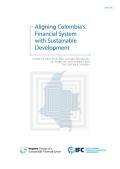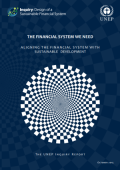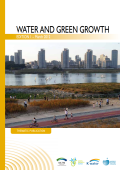
This document has been commissioned by the IFC and the UNEP Inquiry to explore the state of green finance in Colombia within the wider economic and financial sector context, and at the same time, to identify challenges and potential solutions that would enhance the application of environmental, social, and governance (ESG) criteria in the financial sector decision-making process and mobilize more investments for the transition toward a green economy.
The project involved two major steps:
1- it first undertook a holistic mapping of the Colombia green finance landscape with regard to the relevant stakeholders and the relevant types and volumes of finance, as well as current and planned financial policies, regulations, and standards;
2- it then identified the challenges that prevent increased green capital flow, and discussed how these might be overcome.

Adaptation presents developing countries with the ultimate dual challenge – building a rapidly evolving, sustainable economy within an environment increasingly altered by the impacts of climate change. To meet this challenge, adaptation policy must find balance and create synergy between the two, as climate resilience and economic resilience go hand in hand.
Economic development is associated with structural change, including an evolving sector composition, the emergence of new comparative advantages and skills, and shifts in consumer demand as a result of rising incomes – all of which has implications for adaptation. Existing attempts to adapt developing economies to climate change have nonetheless ignored these economic dynamics. Current approaches to adaptation often seek to preserve current structures, for example by protecting agricultural output, which neither acknowledges nor takes advantage of the fact that the status quo is evolving.
Energy efficiency has a plethora of benefits on the individual, organisational, and social levels. However, there is still a gap between knowledge and implementation. While market failure serves as an important barrier to energy efficiency uptake, so do the characteristics of human behaviour. Literature on human behaviour reveals many entry points for the inclusion of ‘behavioural insights’ in the design of energy efficiency programmes.
Drawing from case studies on small and large industry in Colombia, India, South Africa, and Uganda, this report aims to provide practitioners with illustrations of how insights into human behaviour can be effectively integrated into energy efficiency programmes. The incorporation of behavioural insights should consider four aspects: the cultural context of the target group, windows of opportunity for the intervention, drivers and motivations, and the overall fit of the intervention with the package of measures.

This report is the first major output of a project on Water and Green Growth, led by the Government of the Republic of Korea and the World Water Council (WWC). It is the result of over 12 months of research and analysis by an international group of experts. It provides an analysis of 26 case studies that illustrate various aspects of water and green growth, and then uses the analysis to recommend a draft framework for policymakers.
